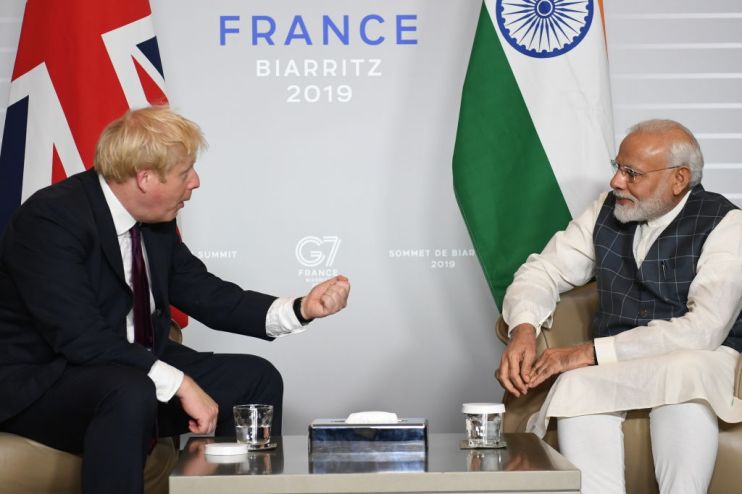Boris Johnson’s visit to India will put his trade principles to the test

In the much anticipated Integrated Foreign Policy & Defence Review published last week, the government set out one of its key principles as “promoting) effective and transparent governance, robust democratic institutions and the rule of law”. Fine words; a clear echo – whether conscious or not – of a fundamental tenet of liberal thought.
It was 245 years ago that Adam Smith told us of “peace, easy taxes and the tolerable administration of justice” as the path to the wealth of a nation. It is to Boris Johnson’s credit that the government now seeks to support the last of these principles in our foreign policy, as well as at home. It is perhaps the most important of the three for without certainty as to property and the law there will be no investment, the very thing which makes the future more prosperous than the present.
An early test of the Prime Minister’s commitment to this principle will come when he visits India next month. There are worrying signs that the authorities in Delhi are moving in the opposite direction, and that the rule of law is being systematically weakened.
Proof of the problem abounds. Vodafone found itself in a disagreement over taxes due on a corporate sale even the Supreme Court of the country, eventually, agreeing against the taxman. At which point a retroactive change to the law was made. Taking the fight to courts not controlled by the Indian government concerned led to an arbitration ruling in Vodafone’s favour, again. Something not dissimilar occurred to Cairn Energy – a dispute over taxation of a corporate disposal, eventually the fight led to an arbitration ruling that the government was wrong. Both of these British firms are still waiting for the Indian government to recognise the legal reality, and to pay the compensation that is theirs by right.
The latest example is that of Devas Multimedia, which signed a contract back in 2005 with Antrix (effectively the commercial arm of the state-run Indian Space Research Organisation, ISRO). Devas had the rights to space-band spectrum usable by launching satellites; Antrix could build and launch. Voluntary cooperation to mutual benefit. Except that by 2011 the government decided to arbitrarily cancel the contract. Devas lost its existing investment, as well as future profits.
Such disputes are clearly going to end up in arbitration. This one has and to no one’s great surprise Devas has won. The Indian government has responded by ignoring the binding arbitration verdict and instead appointing a liquidator to take charge of the specific Devas company inside India that stands to gain from the arbitration award. The government-appointed liquidator is now insisting that the entire case, award, verdict and all, should be dropped.
This is banana republic stuff. Fundamental to Adam Smith’s injunction is not just that the law must exist, but that the government itself must also obey it. Caprice in enforcement by the powers that be is as destructive as absence itself. Investors in India – including British investors – are now discovering the meaning of this statement.
This is not important purely because there are British investors involved. Of course, the Prime Minister will rightly have specific concern about that but there are wider principles at stake, too, as the Integrated Review makes clear. The international rules-based order, from which both the UK and India gain enormously, is underpinned by respect for rules, laws and treaties. When those are ignored or dismissed that is a harm not simply against the plaintiff; it is also another small cut that weakens global democracy.
It also will deter future investment in India. Those who invest abroad do so at least partially at their own risk. The billion and some people of India require investment from abroad in order for them to gain their rightful place – as rich, fat and happy as we are in the UK. The Indian Government increasing that investment risk by reneging on contracts is an unhappy occurrence. Their scrapping of the rule of law when judgements are politically inconvenient is a disaster that will delay India’s enrichment and depress job creation, innovation and future tax receipts.
The Prime Minister must not sweep this worrying trend under the carpet. It should be directly addressed during the visit, not for our sakes but for those of the people of India, and for the alliances of which the U.K. and India are leading members. It is to be hoped that the United States and other democratic leaders will make similar representations during their visits to India.
India needs, and wants investment. The West wants to provide it. The rule of law is the bridge that connects the two. As Deirdre McCloskey has pointed out, the only thing worse than being exploited by a capitalist is not being so. For it is such, the benefit is to India of that rule of law, that adherence to what generates the wealth of nations.